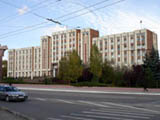|
|
TODAY.AZ / Politics
Separatists seek independence in Moldova
17 September 2006 [18:39] - TODAY.AZ

Critics of Sunday's vote fear it could set a precedent for other regions involved in "frozen conflicts" seeking independence from ex-Soviet States.
Moldova fought separatists in Trans-Dniestr in 1992 in a war that left around 1,500 people dead and has said it will not recognise the vote.
The conflict was ended by Russian troops who have remained in the tiny region, currently numbering 1,200 and Moscow has sent a delegation to observe the vote.
The region's 390,000 voters are being asked two questions are asked two questions: whether they back independence and attachment to Russia or whether they reject independence and want to integrate with Moldova.
Igor Smirnov, Trans Dniestr's president defended the referendum which is not recognised by any western goverments.
"I voted for statehood, for strategic partnership with Russia ... I think all our Dnestr people will vote the same way," he said after casting his ballot in Tiraspol, Trans-Dniestr's main town.
Voters had until 8pm local time to cast their ballots and were offered cheap food and drink when they did so with the red and green separatist flag adorning Tiraspol's streets.
"I was an orphan and was raised by a Russian soldier," Galina, 62, said by her polling station. "Russia is our only choice. I voted for it and I'm delighted."
Moldova accuses Russia of abetting the separatist rebels and it is the same story in Georgia where the breakaway region of South Ossetia is looking to hold a similar referendum in November.
Both Trans-Dniestr and South Ossetia have sought precedents in the former Yugoslavia, where voters in Montenegro have opted for independence and talks in Kosovo are likely to lead to a similar result.
"We are trying to duplicate the experience from Kosovo," Valery Litskai, Dnestr's self-styled foreign minister said on the eve of the vote. "We are looking at them and they are looking at us."
The rest of tiny Moldova, on the opposite side of the Dnestr River, is ignoring the vote and local media said the president, Vladimir Voronin, told officials at a meeting on Saturday to remain calm.
The Organization for Security and Cooperation in Europe has said the vote will be neither free nor fair, and should not be recognized.
"The questions are loaded and suggestive, and from a one-sided perspective," said Claus Neukirch, a spokesman for Moldova's OSCE office.
/Aljazeera.Net/
URL: http://www.today.az/news/politics/30285.html
 Print version
Print version
Connect with us. Get latest news and updates.
See Also
- 21 April 2025 [15:12]
President Ilham Aliyev offers condolences to Kevin Farrell over death of Pope Francis - 21 April 2025 [14:40]
Khojaly massacre: defendant Ghukasyan breaks silence in Baku Court - 21 April 2025 [14:14]
Mayotte was waiting for help, but she waited for Macron - 21 April 2025 [13:18]
Baku to Host Second Turkic Trade and Investment Forum in June - 21 April 2025 [12:38]
Baku court resumes trial of Armenian-origin individuals accused of war crimes - 21 April 2025 [11:11]
What von der Leyen doesn't know about. Or doesn't want to know - 21 April 2025 [10:00]
Pakistani PM hails Lahore-Baku direct flights as key milestone - 18 April 2025 [18:43]
Nearly 69 hectares cleared of mines in liberated Gazakh territories - 18 April 2025 [18:20]
Horadiz-Aghband railway line nears two-thirds completion - 18 April 2025 [14:41]
Separatists & Pashinyan - the farce continues
Most Popular
 What von der Leyen doesn't know about. Or doesn't want to know
What von der Leyen doesn't know about. Or doesn't want to know
 Turkish auto sector shifts gears for green transformation
Turkish auto sector shifts gears for green transformation
 EVs could raise carbon emissions without clean energy, international study finds
EVs could raise carbon emissions without clean energy, international study finds
 South Korea conduct large-scale night exercises on border with DPRK
South Korea conduct large-scale night exercises on border with DPRK
 Bayramov: Direct talks yield better results than mediated dialogue
Bayramov: Direct talks yield better results than mediated dialogue
 Japan grants $3 billion loan to Ukraine using profits from frozen Russian assets
Japan grants $3 billion loan to Ukraine using profits from frozen Russian assets
 Kyrgyzstan and South Korea discuss bilateral relations
Kyrgyzstan and South Korea discuss bilateral relations
